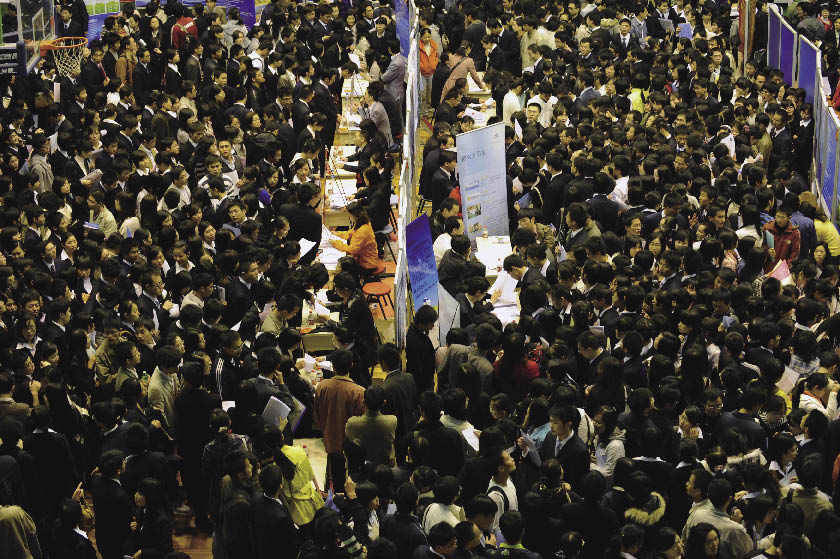| Beijing Braves a Cold Cold Winter
By staff reporter LU RUCAI
 |
|
Job prospects are bleak for the six million university graduates of 2009. |
BEIJING and its 16 million residents are entering an unusually chilly winter season – though the chill is more economic than climatic. Xie Jiangbo, an MBA student with the prestigious Guanghua School of Management at Peking University, knows that the big crowd of international investment banks that courted alumni before him won't appear this year, and he is ready to seek jobs in other fields. Graduates of 2009 share the fate of entering the work force at a bad time, when the world is sinking deeper into a financial crisis that has affected almost every country.
"I think the financial crisis first took its toll on the financial sector, then services and then manufacturing," says Xie, who majored in economics and studied finance as a postgraduate. Beijing's economy is increasingly based on finance and the service industries, so the crisis is hitting the capital hard.
No Safe Turf
When the impact of the financial slump was becoming clear at the end of 2008, Cherry Lin took up a job at Canon after eight months with British headhunting company Antal International. According to her experience, headhunting is a keen barometer of the economic situation. When the economy was brisk, the section where Ms. Lin worked was busy scouting talent for a swathe of big names in the fast moving consumer goods (FMCG) industry. Many of their clients were in the world's top 500 list, such as P & G and Coca Cola.
"The most vibrant teams were accountancy and banking before the second half of 2008," Lin recalls. The hectic stock market and real estate sector generated soaring demand for financial professionals, which brought the two sections increasing business and profits. But their ascendancy came to a grinding halt with the sudden unraveling of the financial markets. "The financial teams were grabbing FMCG clients from us. They have shed jobs and the business outlook still remains dim." Lin says many companies have abandoned hiring plans established at the beginning of 2008 due to much diminished budgets.
The automobile and IT industries were also among the hardest hit. Even the three US auto giants have come to the brink of bankruptcy. Domestic automakers, still young in the business, face a bitter struggle for survival. As for the IT industry, it has always relied heavily on risk investment, and could not save its own skin in the financial disaster.
These factors add up to one big ice storm in the employment market, affecting a broad spectrum of job-seekers, from fresh graduates to senior managers.
Before she left Antal, Lin failed to find a new job for a marketing manager who contacted her in September. "When I first spoke to him last July, he had no desire to leave his job. After HP purchased EDS (Electronic Data Systems) the department he worked for cut 80 percent of its staff, and unfortunately he was one of them."
Lin's company predicts a turnaround in the economic situation around April or May this year. But many other firms are less optimistic.
In any case, Xie Jiangbo isn't waiting around for the economic thaw. After a hard look at the situation, he adjusted his job hunting sights from investment banks to state-owned commercial banks. "The experience of friends tells me that a job with a state-owned bank is comparatively secure." He estimates that the number of graduates entering the financial sector will drop by 70 percent in 2009.
Employment opportunities are shrinking in almost all parts of the economy, a bleak prospect for the 6 million Chinese college graduates this year. Their lack of work experience puts them at a huge disadvantage when competing with laid-off workers, whose numbers are steadily swelling. According to the blue book on China's economy by the Chinese Academy of Social Sciences, the number of unemployed college graduates was around 1 million by 2008. With a new crop of graduates in sight, the figure will surely grow into an even more worrying one.
| 